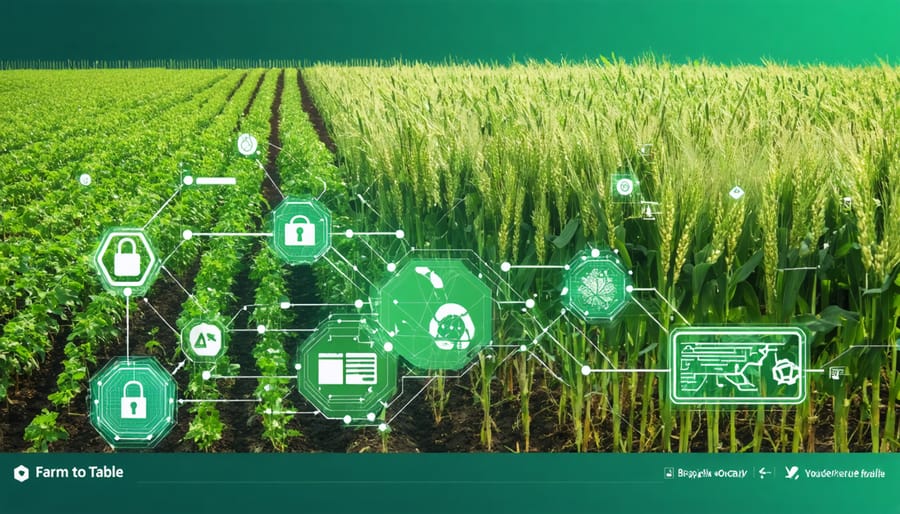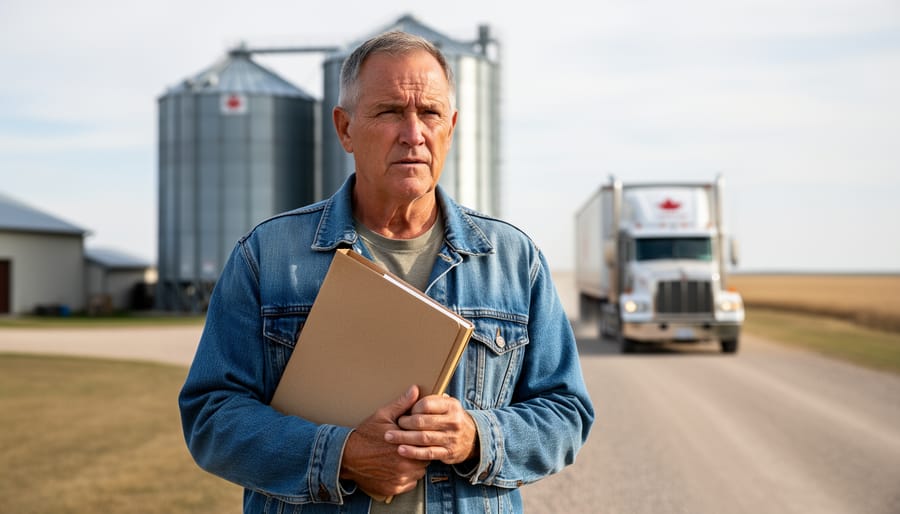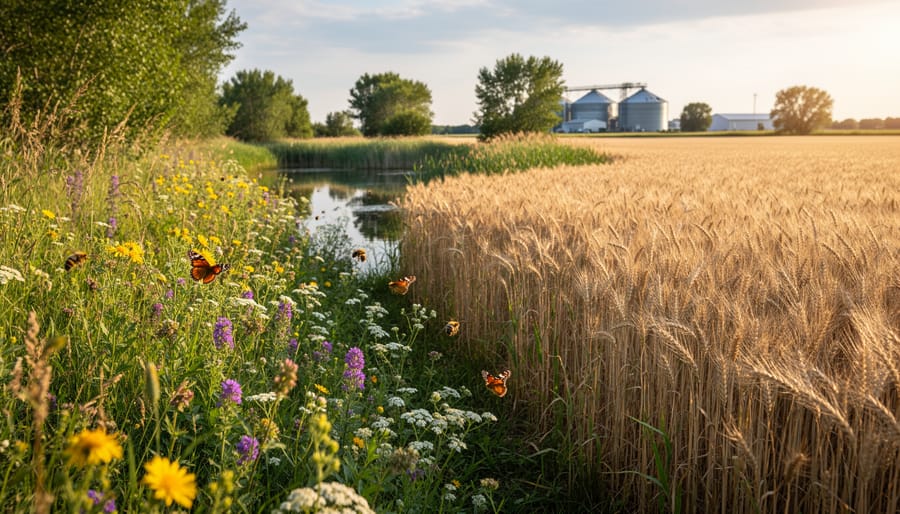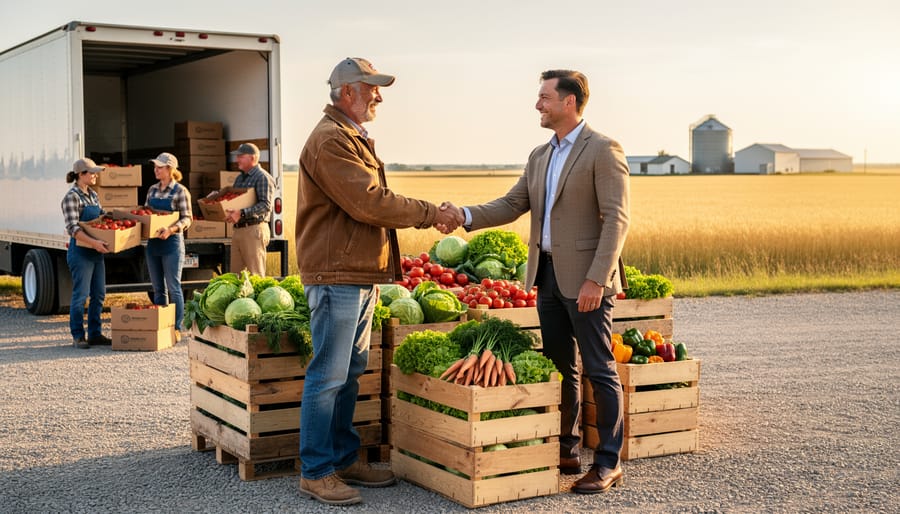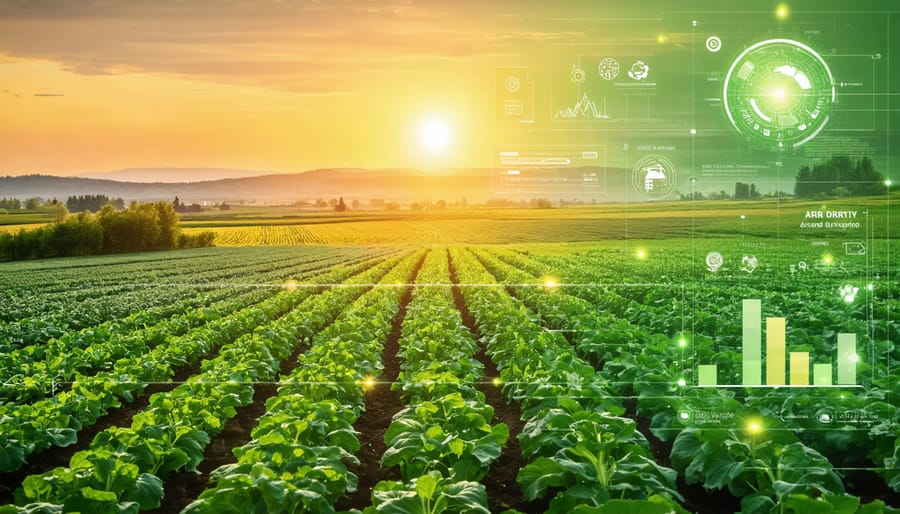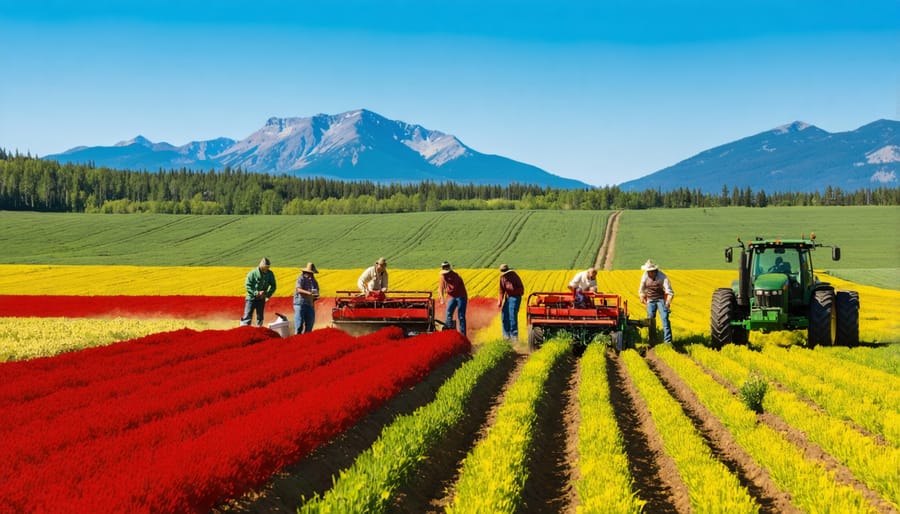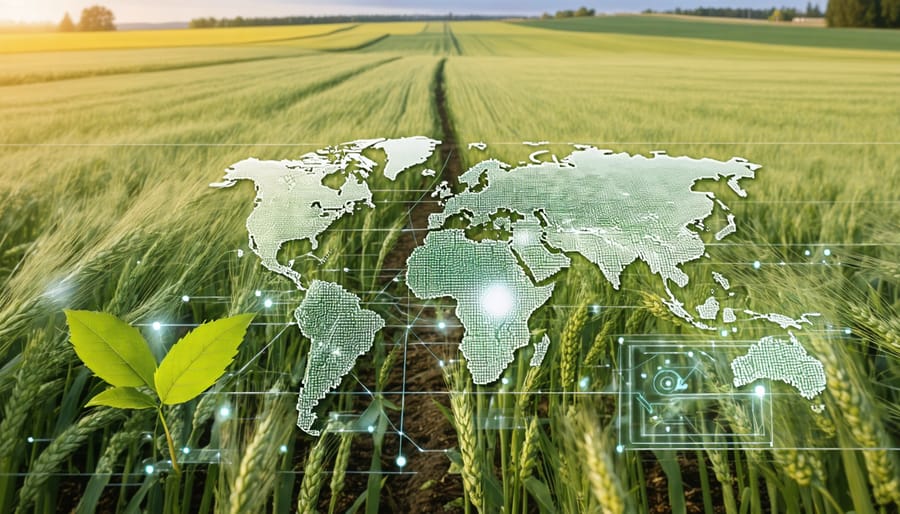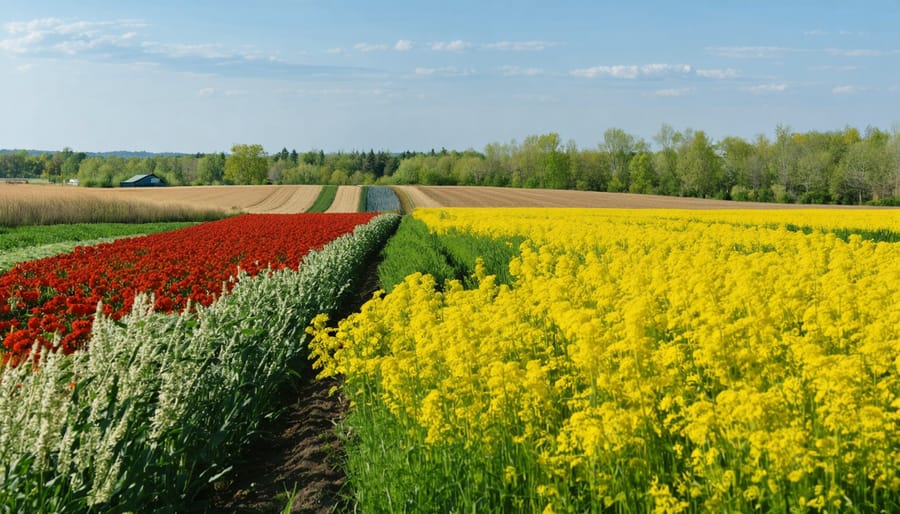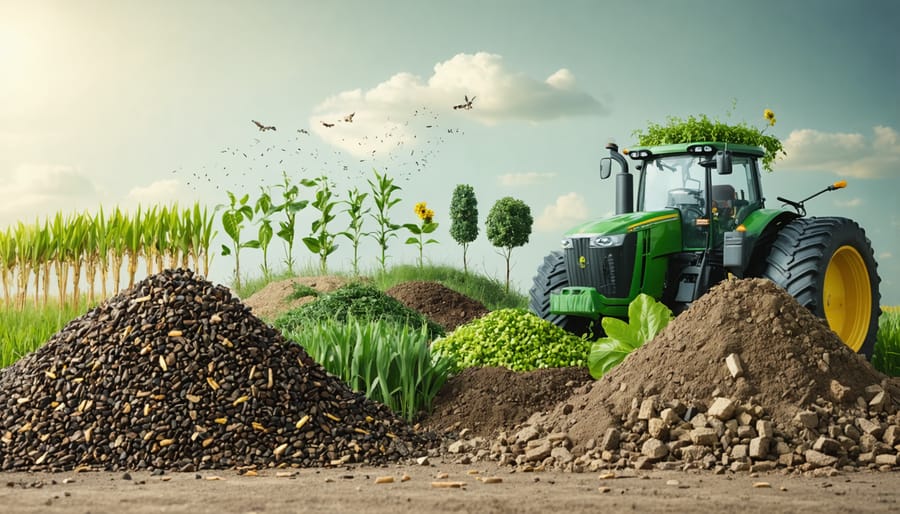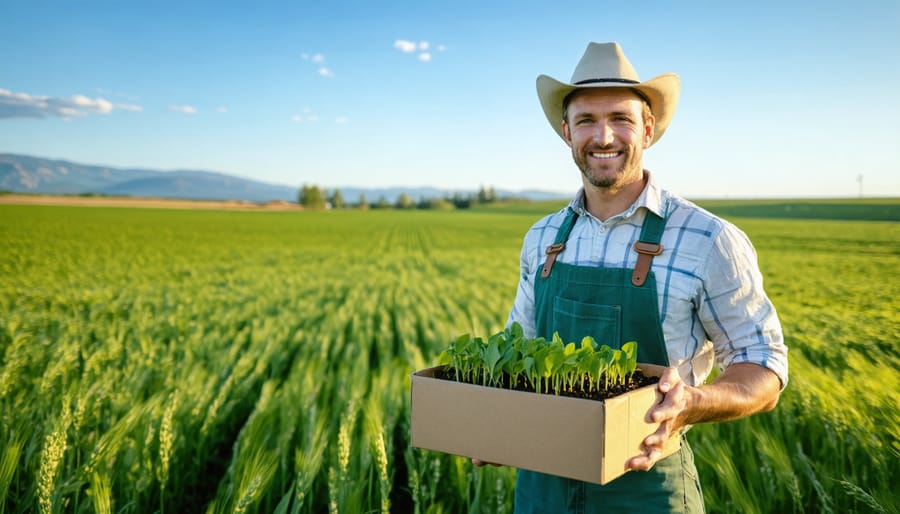Blockchain technology transforms sustainable supply chain practices by creating an unalterable digital record of every transaction, from seed to shelf. For Alberta farmers, this breakthrough enables real-time tracking of crop movements, instant verification of organic certifications, and seamless documentation of sustainable farming practices.
Canadian agriculture stands at the forefront of this revolution, with blockchain platforms already helping Prairie grain producers secure premium prices through verified sustainability credentials. Local success stories, like the Alberta Wheat Commission’s pilot program, demonstrate how this technology increases farmer profits by 15-20% through enhanced supply chain transparency and direct market access.
The integration of blockchain with existing farm management systems offers unprecedented accountability while protecting sensitive business data. Farm-level implementation requires minimal technical expertise, operating through user-friendly mobile apps that connect directly to existing digital record-keeping systems. For Canadian producers looking to strengthen their market position and meet growing consumer demand for transparent food systems, blockchain provides the missing link between field operations and consumer trust.
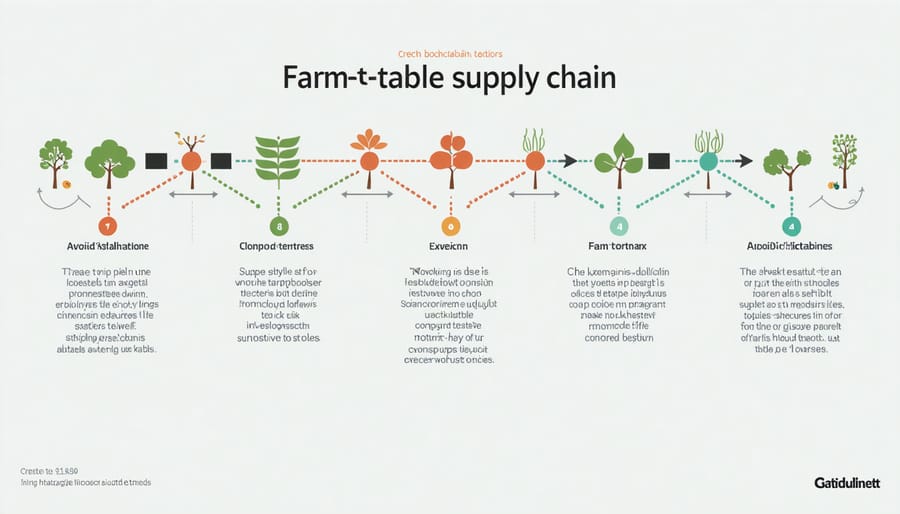
Real Benefits of Blockchain Traceability for Alberta Farmers
Product Authentication and Premium Pricing
When farmers implement blockchain tracking for their products, they unlock significant pricing advantages in the marketplace. By providing verifiable proof of sustainable practices and product origin, blockchain enables producers to command premium prices from environmentally conscious consumers. For example, Alberta grain farmers using blockchain verification have reported price premiums of 15-20% for their certified sustainable crops compared to conventional markets.
The system works by creating an unalterable digital record that follows circular economy principles and validates sustainable farming practices. Each step of the production process – from seed selection to harvest methods – is recorded and verified, giving buyers confidence in their purchase decisions.
This transparency particularly benefits organic farmers and those implementing regenerative agriculture practices. When consumers can verify that products meet specific sustainability standards, they’re willing to pay more. Local success stories include Peace Country organic wheat producers who’ve secured contracts with premium mills at 25% above market rates by providing blockchain-verified sustainability credentials.
For farmers considering blockchain implementation, the initial investment is often offset within the first two growing seasons through improved market access and higher product pricing.
Reduced Certification Costs
For Canadian farmers, blockchain technology offers significant cost savings when it comes to certification processes. Traditional certification methods often require multiple third-party verifiers, extensive paperwork, and time-consuming audits that can cost thousands of dollars annually. By implementing blockchain-based verification, farmers can reduce these expenses by up to 50%.
Take the example of the Alberta Organic Producers Association, which recently helped its members cut certification costs by $2,500 per year through blockchain adoption. The system automatically records and verifies farming practices, reducing the need for frequent on-site inspections and streamlining the organic certification process.
The technology creates an immutable record of your agricultural practices, from seeding to harvest, making it easier to demonstrate compliance with various certification standards. Instead of maintaining multiple paper trails and coordinating with different certifying bodies, you can maintain a single digital record that’s instantly verifiable.
For smaller family farms, this means more resources can be directed toward improving operations rather than managing paperwork. The system’s efficiency also allows for faster certification renewals, helping you maintain market access without lengthy processing delays.
Implementing Blockchain in Your Farm Operations
Getting Started with Farm Data Recording
Getting started with farm data recording for blockchain implementation doesn’t have to be overwhelming. As an Alberta farmer, you’ll likely already have many of the basic requirements in place. You’ll need a smartphone or tablet, reliable internet connection, and basic digital literacy skills to interact with farm management software.
Begin by documenting your current record-keeping practices. Create a simple inventory of what you’re already tracking, such as seeding dates, fertilizer applications, harvest yields, and storage conditions. This baseline assessment will help identify any gaps in your data collection process.
The next step is selecting appropriate farm management software that supports blockchain integration. Many Canadian agricultural technology providers now offer user-friendly platforms designed specifically for our growing conditions and regulatory requirements. Look for solutions that allow easy data entry in the field and can work offline when needed.
Essential data points to record include:
– Crop variety and seed source
– Planting dates and conditions
– Input applications (fertilizers, pesticides)
– Weather events
– Harvest dates and yields
– Storage locations and conditions
– Transportation details
Start small by focusing on one crop or field to build confidence with the system. Many successful Alberta farmers began their blockchain journey by tracking canola or wheat production before expanding to their entire operation.
Remember to maintain consistent recording habits – it’s better to have fewer, accurate records than scattered, incomplete data. Consider appointing a family member or trusted employee as your farm’s data champion to ensure regular updates and proper documentation.
Most importantly, reach out to your local agricultural extension office or farming association for guidance. They often offer training sessions and can connect you with other farmers who have successfully implemented blockchain tracking systems.
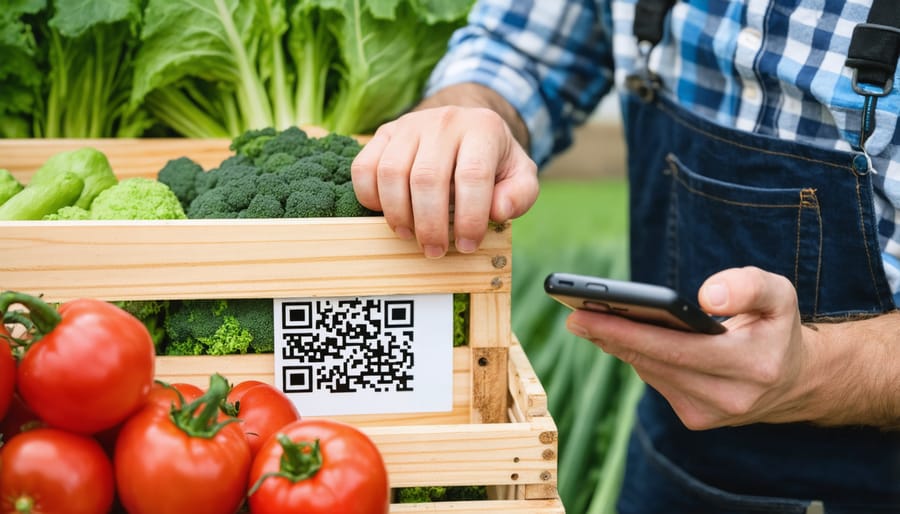
Connecting with Supply Chain Partners
Success in implementing blockchain transparency starts with building strong partnerships across your supply chain. As an Alberta farmer, your first step is reaching out to your existing processors and distributors to discuss blockchain integration. Start these conversations by highlighting mutual benefits like improved traceability and reduced paperwork.
Many processors across Alberta are already exploring blockchain solutions, making them potential collaboration partners. For example, several meat processing facilities in Brooks and Calgary have pilot programs you can join. When approaching processors, come prepared with specific questions about their current tracking systems and how blockchain could enhance them.
Your distributors and retailers are crucial links in the chain. Major grocery chains like Sobeys and Loblaws have blockchain initiatives that farmers can participate in. These programs often provide technical support and sometimes offer premiums for blockchain-traced products.
Consider joining local agricultural cooperatives that are implementing blockchain solutions. These groups often provide training and shared resources, making implementation more manageable and cost-effective. The Alberta Federation of Agriculture regularly hosts workshops where you can connect with potential partners and learn from farmers who’ve already integrated blockchain systems.
Remember to start small – perhaps with one product line and a few key partners. Document your requirements clearly, including what data needs to be shared and how often. Many successful partnerships begin with a trial period of 3-6 months to work out any technical issues.
Regular communication is essential. Schedule monthly check-ins with your partners to address challenges and share successes. This collaborative approach ensures everyone stays aligned and committed to the blockchain initiative’s success.
Success Story: Red Deer Valley Organic Farm
Located just outside of Red Deer, Alberta, the Red Deer Valley Organic Farm has transformed its operations through blockchain technology, becoming a pioneer in supply chain transparency. Farm owners Sarah and Mike Thompson implemented a blockchain-based tracking system in 2021, allowing consumers to trace their products from field to table with unprecedented detail.
The Thompsons’ journey began when they noticed increasing demands from their customers for verification of organic practices and local sourcing. “Our regular customers at the farmers’ market were asking more questions about our growing methods and handling processes,” says Sarah. “We realized we needed a better way to share our story and prove our commitment to organic farming.”
Working with a local tech startup, they developed a user-friendly system that tracks every step of their production process. Each batch of produce receives a unique QR code that, when scanned, reveals the complete history of the product – from planting date and field location to harvest time and storage conditions. The system also records important certification details and test results for soil quality and organic compliance.
The implementation has yielded impressive results. In the first year alone, the farm saw a 30% increase in direct-to-consumer sales and established new partnerships with premium restaurants in Calgary and Edmonton. Chefs particularly appreciate the ability to verify the exact harvest date and handling conditions of their ingredients.
The system has also streamlined the farm’s organic certification process. “What used to take days of paperwork and filing now happens automatically,” Mike explains. “Our certifying body can access real-time records, making annual audits much more efficient.”
The investment in blockchain technology, while initially daunting at $15,000, paid for itself within 18 months through increased sales and operational efficiencies. The Thompsons now save approximately 10 hours per week on administrative tasks, allowing them to focus more on farming and customer relationships.
The farm’s success has inspired other local producers to explore blockchain solutions. The Thompsons regularly host workshop days where they share their experiences with fellow farmers, contributing to a growing community of tech-savvy agricultural enterprises in central Alberta.
“The most rewarding part,” Sarah notes, “is seeing customers engage with our story. When someone scans a code on their carrots and can see exactly which field they came from and when they were harvested, it creates a real connection to their food source.”
Environmental Impact Tracking
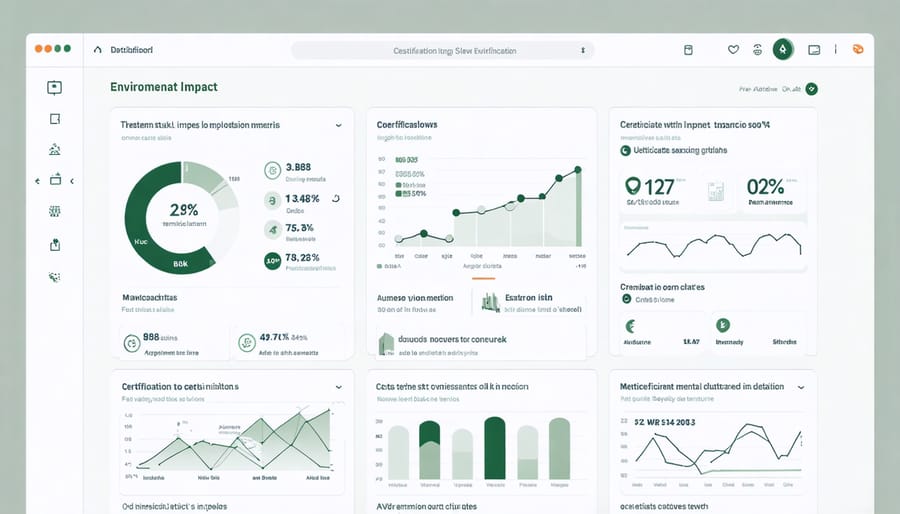
Carbon Footprint Monitoring
Modern blockchain solutions are revolutionizing how we track carbon emissions throughout agricultural supply chains. By integrating smart sensors and IoT devices, farmers can now monitor their environmental impact in real-time, from field operations to product delivery. These systems work alongside renewable energy in agriculture initiatives to create a comprehensive sustainability tracking system.
Alberta farmers are particularly benefiting from this technology, with several operations using blockchain to record and verify their carbon offset credits. The system automatically captures data on fuel consumption, fertilizer usage, and soil management practices, converting these inputs into accurate carbon footprint measurements.
For example, the Smith family farm in Red Deer reduced their emissions by 15% in their first year of implementing blockchain monitoring. Their success came from having precise data that helped them optimize their operations and make informed decisions about equipment usage and field management.
The technology also enables farmers to generate detailed sustainability reports, which are increasingly valuable for accessing premium markets and meeting export requirements. These verified environmental credentials help Alberta producers stand out in competitive international markets while contributing to Canada’s climate action goals.
Sustainability Certification
Blockchain technology is revolutionizing how we verify and track sustainable farming practices and environmental certifications across Alberta’s agricultural sector. By creating immutable records of environmental compliance data, farmers can now provide transparent proof of their sustainability efforts to consumers, regulators, and certification bodies.
For example, Calgary-based grain producers are using blockchain to document their carbon footprint reduction initiatives, water usage, and soil conservation methods. This digital ledger automatically records and validates sustainability metrics, making it easier to maintain organic certifications and demonstrate compliance with environmental standards.
The system allows farmers to track and verify multiple certification requirements simultaneously, from pesticide-free cultivation to regenerative agriculture practices. Real-time data collection through IoT sensors and blockchain verification helps reduce audit costs and streamlines the certification renewal process. For Alberta farmers, this means less paperwork and more time focused on what matters most – working the land.
When certification bodies can access verified sustainability data directly from the blockchain, it creates a trustworthy system that benefits everyone in the supply chain, from producer to consumer.
Blockchain technology offers Alberta farmers a powerful tool for building trust and transparency throughout the agricultural supply chain. By implementing this solution, you can create an unalterable record of your products’ journey from field to market, providing consumers with the authentic story of their food’s origins while protecting the value of your sustainable farming practices.
The key benefits we’ve explored – from enhanced traceability and reduced paperwork to premium pricing opportunities and stronger buyer relationships – make blockchain a worthwhile investment for forward-thinking farm operations. As we’ve seen from local success stories, even smaller farms can begin implementing blockchain solutions through collaborative initiatives and industry partnerships.
To get started, consider joining regional blockchain pilots or connecting with agricultural cooperatives already using this technology. The Alberta Federation of Agriculture and local agricultural extension offices can provide guidance on available resources and funding opportunities. Remember, you don’t need to transform your entire operation overnight – start small, focus on high-value crops or products, and scale up as you become more comfortable with the system.
By embracing blockchain technology today, you’re not just improving your operation’s efficiency – you’re positioning your farm for success in an increasingly transparent and sustainability-focused agricultural marketplace.

